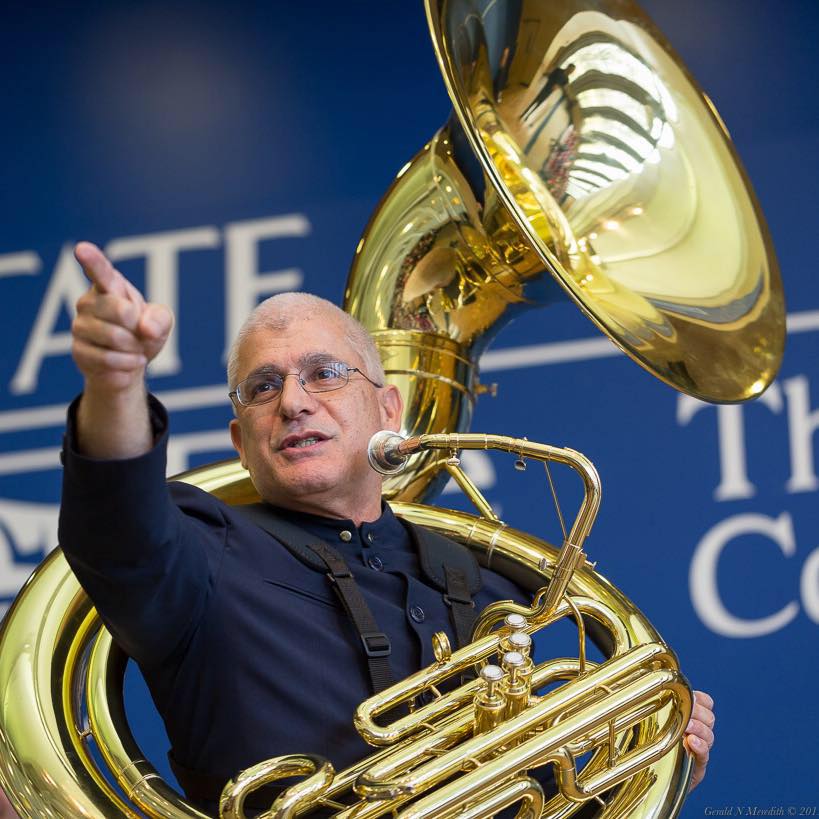
Devoted students and music-lovers have been mourning the loss of internationally renowned tubist Sam Pilafian, who passed away on April 5, 2019 in his fight against colon cancer.
“There will never be another Sam,” said Ted Cox, Oklahoma City Philharmonic member and longtime friend of Pilafian in an interview with the Armenian Weekly. “What he did with his career was so unique. He created work with the brass quintet and made it a full time job, and took [the tuba] to another level.” Indeed, Pilafian elevated the tuba as founding member of the Empire Brass Quintet, performing worldwide and inspiring and mentoring aspiring brass players across the nation.
Pilafian was born in 1949 in Miami, Florida to Armenian parents. His father James Pilafian came to Ellis Island as a refugee from Syria and grew up in Massachusetts; his mother Rosa “Shaki” (Boyajian) grew up in Virginia. Sister Marni Pilafian told the Armenian Weekly that her parents were the founding members of St. John’s Apostolic Armenian Church, the first Armenian Church in Florida. Her brother Sam was the first baby baptized in this church in 1949.
Pilafian developed a love for music and the Armenian culture at an early age. “Sahag,” as his family called him, first discovered his musical talents with the accordion. His sister Marni tells the Weekly that her mother would always look for Armenian sheet music for her son to practice and play. Pilafian also had a great respect the Armenian church and the badarak. Marni remembered that her brother always asked the priest for the sheet music to learn the minor chords.
“Sam’s strong foundation came from listening to Armenian music, which had such a huge influence on him even at an early age when most students are only learning Western music,” said Marni in her interview with the Armenian Weekly. Even though his father wanted him to be a lawyer, Pilafian pursued his musical interests with his mother’s unwavering support. At 4’10, she would carry her son’s tuba up four flights of stairs every Monday and Friday for lessons.
Pilafian got his first job playing on a movie soundtrack in New York when he was 21 years old; he was an invaluable talent because he could create any sound the movie producers wanted. He later played the tuba for Pink Floyd. His deep tones form the backdrop to the rock band’s 1979 album The Wall. Pilafian’s journey to fame was not typical of most tuba players. He started out in hotels and backing influential singers like Frank Sinatra and Liza Minnelli, and eventually carved his own path.
He went on to become a professor of tuba at the University of Miami’s Frost School of Music in his hometown. He was a dedicated teacher and taught at notable educational institutions including Boston University’s Tanglewood Institute, where he befriended Cox. He also taught at Berklee’s College of Music and Arizona State University. Students knew him as “Yeah Man Sam” because he always encouraged his students to play their instruments fearlessly.
Cox told the Armenian Weekly that Pilafian’s resume was about 22 pages long. He was the most recorded tubist in history with 83 albums under his name. According to Facebook, his latest gig was joining the Eastman Tuba team. Cox laughed when remembering how hectic Pilafian’s schedule was, noting that he could never keep up with his travels and various projects. In addition to his international tours, he was a consultant to the Royal Academy of Music in London and was the honorary board of director of the International Tuba Euphonium Association, where he later won a Lifetime Achievement Award. He even co-authored “The Brass Gym” and “The Breathing Gym” with fellow brass player Patrick Sheridan, teaching students comprehensive daily workouts for playing wind instruments.
His influence was felt all across the nation during his 40-year career. In 1985, a young Pilafian enthusiastically taught beloved children’s show host Mr. Rogers how to play the tuba; Mr. Rogers was enraptured with Pilafian’s masterful rendition of John Philip Sousa’s Stars and Stripes Forever. Pilafian never stopped broadening his horizons in the music world and many thought of him as the best tuba player in the world.
On occasion, Pilafian paid tribute to his Armenian heritage with his music. He performed at the Calouste Gulbenkian Museum in Portugal. Marni said her brother was “always receptive to helping Armenian students with music.” He even learned to play the oud, but couldn’t pursue it with his busy schedule. “Throughout his career, he encouraged others to consider Armenian music and not only Western music,” said Marni.
The Empire Brass Quintet also paid homage to Armenian composer Alan Hovhaness’ 1947 Sharagan and Fugue for the brass choir, incorporating the tuba in hymns from the Armenian Orthodox church. This pastiche of musical elements was a testament to his musical adaptability. His four part album “Relentless Grooves” highlighted Armenian music using authentic instruments from pagan times up to the modern era and skillfully incorporated the tuba into the Armenian sharagan. Pilafian even taught an Armenian music program. “It was well-known he was Armenian,” said his friend Cox. “He didn’t hide it. Everyone knew he was Armenian. His paternal grandfather survived the genocide. He was a factory worker.” Pilafian incorporated the Armenian culture in his music in a way that no one else could. “I remember him playing the Artunian workshops,” recalled Cox. “It was incredible. He got the traditional Armenian orientation. Nobody else could do that.”
Many students and admirers have flooded social media to pay tribute, posting videos of themselves playing the tuba. Other students have taken to their practice rooms to carry out his legacy.
He was known as the “Evel Knievel of Tuba” for his risk-taking, evident in his solo career and for occasionally playing the tuba while doing headstands. While he was in college, he bandaged his own eyes for four days to understand his fellow blind musician Mike Gerber and his process of showmanship, and claimed that his hearing became clearer and “nothing was the same after that.” His gusto, playfulness and determination brought him success across the music industry, charming music lovers across the globe.
He had recorded and performed with the best orchestras in the world, reaching almost every corner of America. Though the tuba is known to be a jazz instrument, Pilafian’s tuba tapped into all genres and pushed the boundaries of classical, jazz, pop, rock and world music. Guest artist to the Empire recital and member of the jazz group Travelin’ Light Frank Vignola compared him to legend Louis Armstrong because they both “broke all the rules.”
“There is a very big hole in my life now,” said Pilafian’s friend of 33 years. “I never thought he’d die this young.”
Pilafian is survived by wife Diann (Jezurski), two sons, Alexander Sarkis and Zev Levin-Pilafian, and his sisters Marni and Nerisa.



Be the first to comment